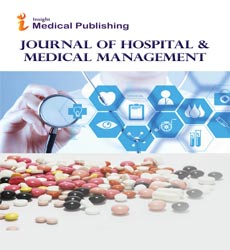Effect of Arrhythmia
Jun Ma
DOI10.36648/2471-9781.7.1.267
Jun Ma
Assistant Professor, China Health Centre, China. E-mail: jun.ma@gmail.com
An arrhythmia may be a issue with the rate or beat of the pulse. Amid an arrhythmia, the heart can beat as well quick, as well gradually, or with an sporadic beat. When a heart beats as well quick, the condition is called tachycardia. When a heart beats as well gradually, the condition is called bradycardia. Arrhythmia is caused by changes in heart tissue and movement or within the electrical signals that control your pulse. These changes can be caused by harm from illness, damage, or hereditary qualities. Frequently there are no indications, but a few individuals feel an unpredictable pulse. You will feel swoon or woozy or have trouble breathing. The foremost common test utilized to analyze an arrhythmia is an electrocardiogram (EKG or ECG). Your specialist will run other tests as required. She or he may suggest medications, arrangement of a gadget that can rectify an unpredictable pulse, or surgery to repair nerves that are over stimulating the heart. In the event that arrhythmia is cleared out untreated, the heart may not be able to pump sufficient blood to the body. This could harm the heart, the brain, or other organs.
Arrhythmias can be caused by:
- Coronary artery disease
- High blood pressure
- Changes in the heart muscle (cardiomyopathy)
- Valve disorders
- Electrolyte imbalances in the blood, such as sodium
- Injury from a heart attack
- The healing process after heart surgery
- Other medical conditions
Coronary artery disease
Coronary course malady creates when the major blood vessels that supply your heart ended up harmed or unhealthy. Cholesterol-containing stores (plaques) in your coronary supply routes and irritation are ordinarily to fault for coronary supply route malady. The coronary courses supply blood, oxygen and supplements to your heart. A buildup of plaque can contract these courses, diminishing blood stream to your heart. In the long run, the diminished blood stream may cause chest torment (angina), shortness of breath, or other coronary course illness signs and side effects. A total blockage can cause a heart assault.
High blood pressure
Hypertension, or tall blood weight, alludes to the weight of blood against your course dividers. Over time, tall blood weight can cause blood vessel harm that leads to heart alady, kidney infection, stroke, and other issues.
Cardiomyopathy
Cardiomyopathy (kahr-dee-o-my-OP-uh-thee) could be a malady of the heart muscle that creates it harder for your heart to pump blood to the rest of your body. Cardiomyopathy can lead to heart disappointment. The most sorts of cardiomyopathy incorporate expanded, hypertrophic and prohibitive cardiomyopathy.
Valve disorders
Heart valve stenosis is additionally connected to the next hazard for atrial fibrillation. For case, mitral valve stenosis comes about in an obstacle to blood stream from the left atrium to the cleared out ventricle causing the weight to extend within the cleared out chamber. As a result, the heart broadens, and atrial fibrillation can happen.
Injury from a heart attack
Arrhythmias can create after a heart assault as a result of harm to the heart muscles. Harmed muscles disturb electrical signals that control the heart.
The healing process after heart surgery
Cardiac removal may be a method that can redress heart cadence issues (arrhythmias). Cardiac removal works by scarring or pulverizing tissue in your heart that triggers or maintains an anomalous heart rhythm.
Open Access Journals
- Aquaculture & Veterinary Science
- Chemistry & Chemical Sciences
- Clinical Sciences
- Engineering
- General Science
- Genetics & Molecular Biology
- Health Care & Nursing
- Immunology & Microbiology
- Materials Science
- Mathematics & Physics
- Medical Sciences
- Neurology & Psychiatry
- Oncology & Cancer Science
- Pharmaceutical Sciences
